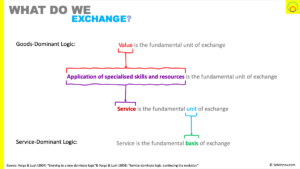A service-dominant logic approach requires us to stop seeing a goods vs service world where service is a poor relative to goods. And instead, embrace a service-first world where goods help us transport a service.
At first glance, this might seem that we are challenging the over 300-year old goods-dominant view of our world. But it is an evolution in thinking, acting and behaving rather than a revolution. One that requires us to stop seeing a goods vs service world and instead embrace a service-first world where goods help us transport a service.
However, they are unlikely to light up the management world. Or get the attention they need. Given the often confusing words choices, like phenomenological, or using words that have a different meaning than usual, as in the case of institutional.
Let's make service-dominant logic more approachable by doing two things:
- Group premises together into the clear "what", "who" and "how"
- Explore what the definitions really mean






